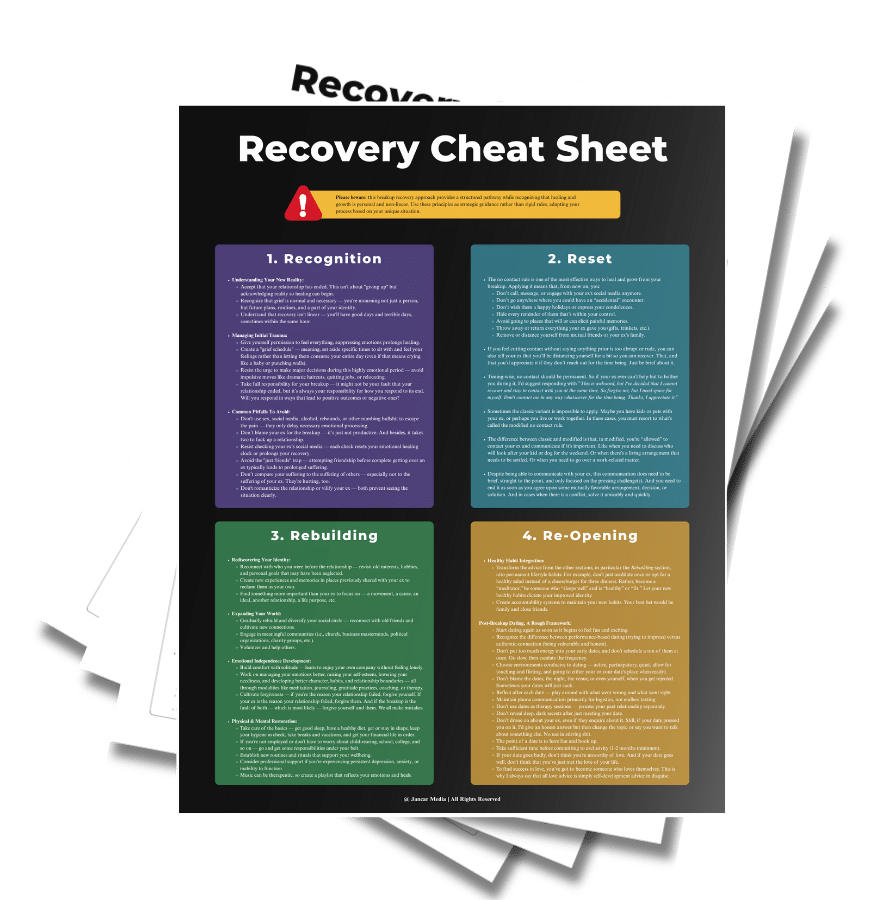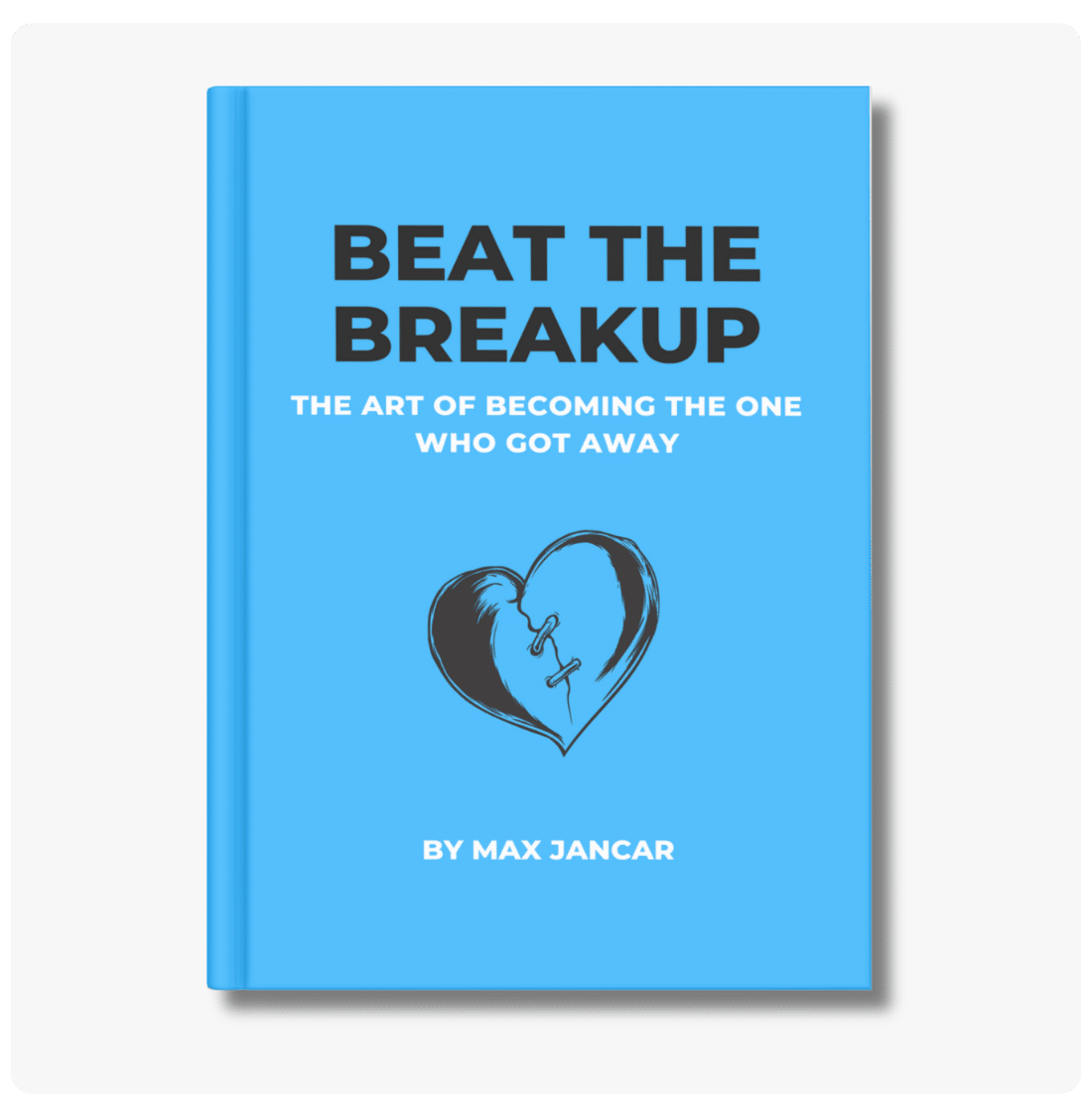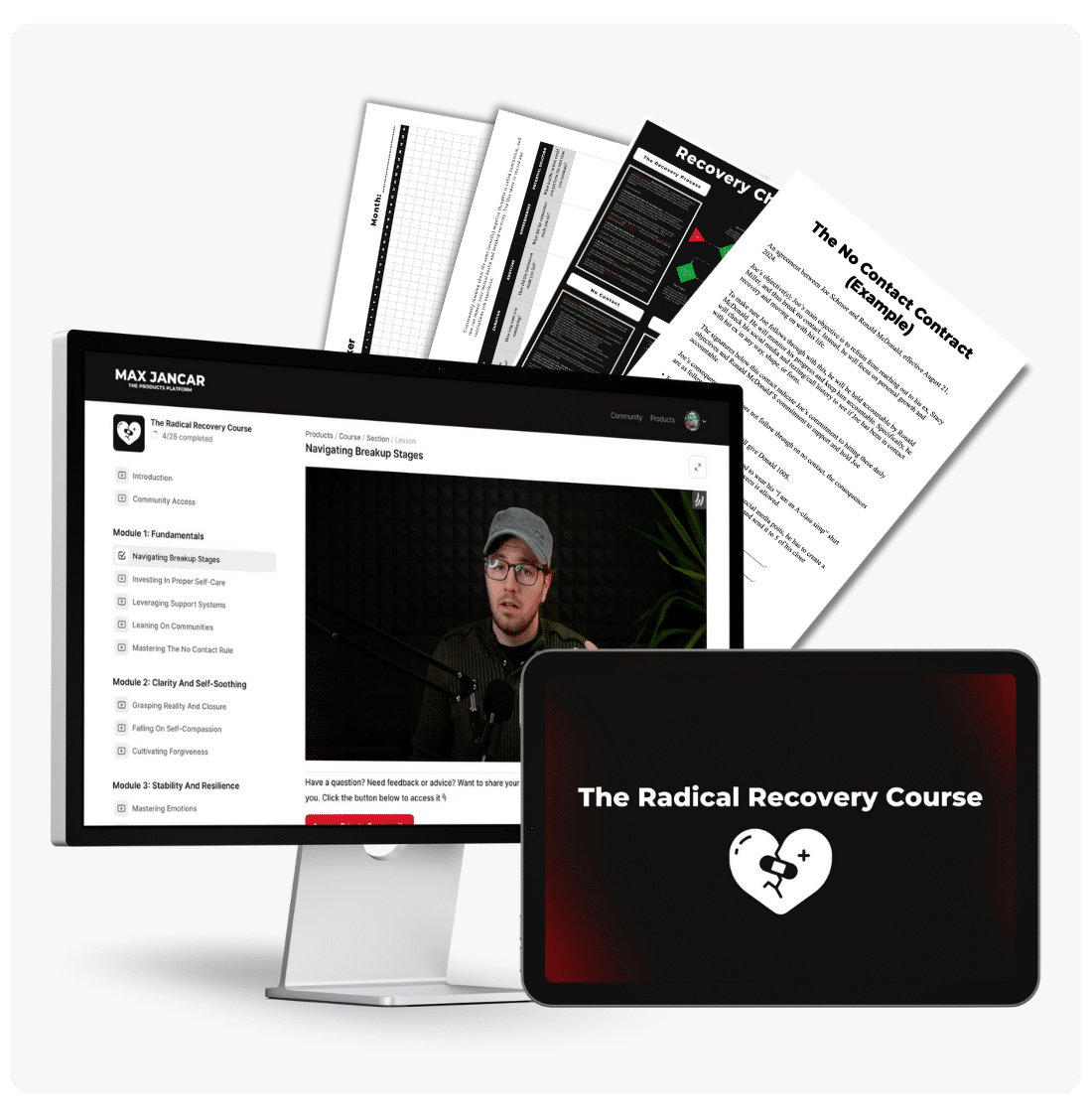Click play to listen to this article.
It’s wise to have a support system in place post-breakup. Same story with being part of a meaningful community. If your situation is severely affecting you emotionally, it also doesn’t hurt to seek out a therapist. Finally, there’s dating. I recommend you start as soon as is reasonable.
That’s a lot to take in, so let’s tackle these four fuckers individually.
A guide to breakup recovery based on embracing discomfort, extracting wisdom from dark moments, and healing through evidence-based practices.
Order Your Copy1. Support Systems
A support system is a group of friends, family members, and peers that you trust and feel safe with and who will actively listen to your concerns, give heartfelt advice, and consistent well… support — even when you’re being a dickhead or wallowing in your own self-pity.
No matter how big of a badass you think you are, such a system is required. Because none of us can stand up on our own post-breakup. As human beings, we have evolved to be somewhat emotionally dependent on each other, to rely on each other, and need each other, especially in our trying times.
We also all need to feel understood, recognized, and affirmed by others. We all need to feel that we belong somewhere, even when, in reality, we don’t belong anywhere.
So, if you don’t have a support system yet or have one you’re unhappy with, start reaching out to people. Get new friends, reconnect with old ones, hang out more often with peers, and spend more time with your family. It’s that simple.
A word of warning, though: once you’ve assembled your support system, know there are good and bad ways of leaning on it.
For one, you can ask people in your support system for help, but it needs to be okay for them to say no. Similarly, you can share your problems, but don’t expect anyone to respond to your liking. Emotional support is only valid if it’s given willingly. It needs to be a gift.
Likewise, don’t whine and complain. Say, “I have a problem,” not “I have a problem, and I shouldn’t have that problem, and this isn’t fair, and I don’t deserve this blah, blah, blah…”
The key to getting the help you require is to eliminate any expectation that you shouldn’t have to suffer. Newsflash: life is suffering, and it sure as shit ain’t fair. So rather than focusing on how you shouldn’t be subjected to pain, focus on taking accountability and finding solutions and improvements.
This cheat sheet lays out 40+ solutions to overcoming a breakup so you can create a new opportunity for love — be that with your ex or someone completely different.
Get The Free Cheat Sheet2. Communities
Participate in the communities you find important and where you feel like you belong. Churches and religious groups, volunteer and charity groups, political organizations, local hotspots, specialized niche clubs, business seminars and masterminds — all of these are solid examples of communities that will make it easier to grapple with your grief.
So go and join some communities. I know this is sometimes frustrating and awkward, especially if you’re an introvert like me, but fucking force yourself to do it. You’ll be glad you did. The bigger, more participatory, and active a community is, the better.
Look especially for ones incorporating activities like dancing, hiking, swimming, or gymnastics in addition to discussions. Those are proven to expedite breakup recovery compared to communities where everyone just sits around twiddling their thumbs and scratching their heads.
If you don’t have access to in-real-life communities, those found online are actually a decent alternative. And before you look at me like I have twelve noses, I’ve done the research.
Online groups work just as well as offline ones in terms of helping you deal with the overwhelming post-breakup crisis, granted you’re passionately participating in group discussions and making connections with individuals there.
3. Therapy
While many people waffle back and forth with the idea, the experience can be incredibly life-changing, and I can’t recommend it enough.
A good therapist will act as the examiner — the person asking, “Why?” They will lead you to question your inner world, consider new perspectives about your breakup, and help you realize new things about yourself and your dead relationship. They will also give you an outside and objective perspective on your situation.
The idea behind therapy is simple: making the unconscious aspects of a mind conscious. These are aspects like triggers for your emotional outbursts, niggling insecurities, and self-esteem issues. Once you spawn adequate self-awareness around them, you’ll be able to exercise control over those blemishes. And that’s generally how you take care of your mental and emotional health.
Let me illustrate this for you.
Suppose you always felt uncontrollably anxious when your ex hasn’t called you back. In that case, there’s probably something hidden within your unconscious, causing you to react in such a senseless manner. By attending therapy, you can start burrowing into your past and examining your life problems, personal challenges, and traumas in detail to find the trigger for your anxiety.
Maybe you’ve felt uncontrollably anxious because you had a neglectful father to whom you always tried to prove yourself. Maybe it’s because you had a mother who only showed affection under certain conditions. Or maybe it’s a result of some other obscure trauma you’ve stumbled upon.
A therapist will help you figure these things out. And when that happens, you’ll be able to process your anxiety in a safe environment, which will further allow you to become more aware of that anxiety and, therefore, not feel so powerless to your outbursts when they occur. In time, you should be able to exercise enough emotional control to modify and change your behavior.
One last thing about therapy: don’t be too worried about picking the right type. I know there are many to choose from — REBT, CBT, ACT, existential, Gestalt, interpersonal, Jungian, psychoanalysis, etc. Still, studies show that all of them work to some extent and produce, on average, a relatively similar result. (1) (2)
So just pick one, try it out, and if it resonates, stick with it for the long haul. Because this is a long-term play. The only way to get results with therapy is to stick with it for months, sometimes even years.
4. Dating
An online course that teaches you how to heal and grow from a breakup so you can create a new possibility for love — with or without your ex.
Get Instant AccessYou’d be surprised, but dating also plays a significant role in overcoming your pain and building mental toughness in the face of heartbreak. Just note that you want to start dating only when it feels fun and exciting. Fun and exciting being the keywords here.
This way, you minimize the risk of using dating as a means of distracting yourself from pain or as a way to reap an ego boost or make yourself feel worthy and loved again — which are all one-way tickets to Miseryville. So, while I strongly encourage you to start dating as soon as possible, do some self-examination and pinpoint whether you’re ready for it, then respond accordingly.
If you begin dating for the right reasons, when you’re actually ready, and you stick with it — it brings about a variety of benefits. It makes you feel more confident and at peace. It gets your mind off your ex, leading to less rumination, obsession, and overanalysis. But most importantly, it makes you realize that your ex isn’t special.
And that labeling them as such is an insult to literally millions of other people whom you would find attractive and intelligent and who, unlike your ex, are able, ready, and willing to create a future with you. A future from which you’ll be able to look back at this period and chuckle, knowing how everything you’re feeling and thinking is so unimportant in the grand scheme of life.
This cheat sheet lays out 40+ solutions to overcoming a breakup so you can create a new opportunity for love — be that with your ex or someone completely different.
Get The Free Cheat SheetRelated Reading
- 10 Tips For Making Better Post-Breakup Decisions March 9, 2023
- A No Bullshit Guide To Self-Care After A Breakup September 7, 2023
- How To Deal With Uncertainty After A Breakup April 7, 2021
- The Heart’s Contradictions: 9 Common Post-Breakup Paradoxes April 25, 2025
- The Self-Improvement Paradox: When Progress Feels Painful May 23, 2024
- On Taking Responsibility For Your Breakup December 12, 2021



